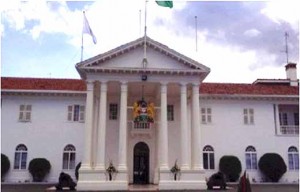 REPORT OF THE AUDITOR-GENERAL ON THE STATEMENT OF RECEIPTS INTO AND ISSUES FROM THE NATIONAL EXCHEQUER ACCOUNT FOR THE YEAR ENDED 30 JUNE 2014
REPORT OF THE AUDITOR-GENERAL ON THE STATEMENT OF RECEIPTS INTO AND ISSUES FROM THE NATIONAL EXCHEQUER ACCOUNT FOR THE YEAR ENDED 30 JUNE 2014
REPORT ON THE FINANCIAL STATEMENT
I have audited the Statement of Receipts into and Issues from the National Exchequer Account for the year ended 30 June 2014 in accordance with the provisions of Article 229(4) of the Constitution of Kenya and Section 8 of the Public Act, 2003. I have obtained all information and explanations which, to the best of my knowledge and belief, were necessary for the purpose of the audit.
Management’s Responsibility for the Financial Statement
The Principal Secretary, National Treasury is responsible for the preparation and fair presentation of the Statement of Receipts into and Issues from the National Exchequer Account in accordance with Government Financial Regulations and Procedures and the Public Finance Management Act, 2012 and for such internal control as management determines is necessary to enable the preparation of a statement that is free from material misstatement, whether due to fraud or error.
The Principal Secretary, National Treasury is also responsible for the submission of the Statement of Receipts into and Issues from the National Exchequer Account to the Auditor-General in accordance with the provisions of Section 80 of the Public Finance Management Act, 2012 and Section 3 of the Public Audit Act, 2003.
Auditor-General’s Responsibility
My responsibility is to express an opinion on this financial statement based on the audit and report in accordance with the provisions of Section 9 of the Public Audit Act, 2003. The audit was conducted in accordance with International Standards on Auditing. Those Standards require compliance with the ethical requirements and that the audit be planned and performed to obtain reasonable assurance that the Statement of Receipts into and Issues from the National Exchequer Account is free from material misstatement.
An audit involves performing procedures to obtain audit evidence about the amounts and disclosures in the financial statements. The procedures selected depend on the auditor’s judgement, including the assessment of the risks of material misstatement of the financial statement, whether due to fraud or error.
In making those risk assessments, the audit considers internal control relevant to the entity’s preparation and fair presentation of financial statement in order to design audit procedures that are appropriate in the circumstances, but not for the purpose of expressing an opinion on the effectiveness of the entity’s internal control. An audit also includes evaluating the appropriateness of the accounting policies used and the reasonableness of accounting estimates
Summary of the Report of the Auditor-General for the Year 2013/2014 72
Made by the management, as well as evaluating the overall presentation of the Statement of
Receipts into and Issues from the National Exchequer Account.
I believe that the audit evidence obtained is sufficient and appropriate to provide a basis for my audit opinion.
Opinion
In my opinion, the statement present fairly, in all material respects, the receipts into and issues from the National Exchequer Account for the year ended 30 June 2014, in accordance with Government Financial Regulations and Procedures and the Public Finance Management Act, 2012 of the Laws of Kenya.
Emphasis of the Matter
Failure to transfer proceeds from the Sovereign Bond to the National Exchequer Account Available information indicates that net proceeds from the Sovereign Bond of USD 1,999,052,872.97 out of the total amount of USD 2,000,000,000.00 were received on 24 June 2014and deposited into an offshore account, contrary to Article 206 of the Constitution of Kenya and Section 17(2) of Public Finance and Management Act, 2012 which requires that all money raised or received by or on behalf of the National Government be paid into the Consolidated Fund.
There is the risk of proceeds being appropriated without the authority of the Controller of Budget and also being applied for other purposes other than those that the Sovereign Bond was floated.
Out of the balance in the offshore account of USD1,999,052,872.97 as at 2 July 2014 an amount of USD 395,439,262.50 (Kshs.34,648,388,180.25) was on 3 July 2014 transferred to the Exchequer Account to fund infrastructure projects but accounted for in 2013/2014 financial year. On the same date of 3 July 2014 another amount of USD 604,560,737.50 (Kshs.53,201,344,900.00) was withdrawn from the offshore account to fund the repayment of the syndicate loan but recorded in 2014/2015 financial year books. Authority of the Controller of Budget to incur the expenditure was however not obtained.
The Statement of Receipts into and Issues from the National Exchequer Account for the year ended 30 June 2014 therefore reflects only actual receipts from commercial loan of Kshs.34,648,388,180.25 out of the net proceeds from the Sovereign Bond as a result of failure to pay the full amount of the net proceeds from the Sovereign Bond of USD 1,999,052,872.97(Kshs.173,917,599,948.39) into the Consolidated Fund during the year.
Summary of the Report of the Auditor-General for the Year 2013/2014 73
I have however, not qualified my audit opinion on the basis of this matter due to the fact that the balance of actual net proceeds from Sovereign Bond is correctly reflected in the Off-Shore Account and in the Central Bank of Kenya Special Account.
Edward R. O. Ouko, CBS
AUDITOR-GENERAL
Nairobi
18 May 2015

